| Books are a vital part of my life, and they
still hold most of the world's wisdom. Notwithstanding the doom-sayers, the printed page is alive and thriving, because it's still the most convenient and comfortable way to read for a long period of time. This page has a number of sub-sections: Game DesignObviously this is the area of greatest interest to me! Unfortunately, the
market is somewhat under-served, with most books being collections of anecdotes or essays.
| 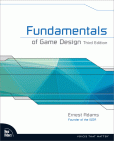
| This is an updated version of the second edition, now with material on the nature of the game business. It still follows the same format as the earlier work, the chapters on the individual genres
have been moved out and into E-books. Attention academics: The book is designed so that it can be used as a textbook, with exercises, and worksheets at the end of each chapter. Click on the title or the cover image for more detailed information.
| 
| Finally, a book on how to design games that appeal to women -- or rather, how to design games so they don't send women away in disgust. Graner Ray argues that it's not so much a question of building features in that women like, so much as leaving out stupid and unnecessary elements that they don't like. We don't need "pink" games, we need good games. Required reading for any designer who doesn't want to limit his market to the male half the population (as most male designers do out of ignorance).
| 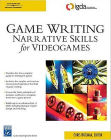
| Most of the books about writing for games are written by people who know a lot about writing and very little about games. This one is a welcome exception. Chris Bateman has assembled a group of
experienced game authors from the IGDA's Writing SIG, and each contributed a chapter on such invaluable subjects as dialog engines, localization, helping the player, nonlinear narratives, and a lot of other things that Robert McKee can't teach you. Because I created the play-by-play for Madden NFL Football for many years, Chris asked me to write the chapter on interchangeble dialog audio.
| 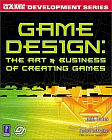
| I don't really consider this to be a book on game design, per se; it's more of a general introduction to the game industry. It's a good one, though, full of useful and accurate information. It discusses planning and production and problems and all sorts of things. And what it does say about game design, I heartily agree with.
|
ReferenceA game designer does a lot of writing, and a writer needs reference works. These are the ones that I use.
| 
| I used to use Webster's Ninth New Collegiate dictionary from Merriam-Webster, which is the standard undergraduate tome. This one is British and much more comprehensive. When I need to get really serious I use my wife's electronic version of the Oxford
English Dictionary, but this is a fine desktop dictionary.
| 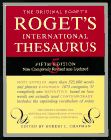
| Roget had the right idea in organizing his thesaurus by topic rather than alphabetically. Alphabetic thesauruses waste too much paper repeating synonyms in different parts of the book. This is still the best, although many different thesauri now use the "Roget" name just as many dictionaries use the "Webster" name.
| 
|
Another essential writer's tool. This is the definitive book on punctuation, usage, and the correct design of documents. When I'm reading someone else's work, bad grammar and punctuation bring me up short and interrupt the flow of ideas. I don't want that to happen when people read what I write, which is why this is on my bookshelf.
| 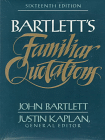
| A great resource for finding famous sayings or
witticisms. Unlike collections of quotations on the Internet, you can be sure these are all properly documented and accurately reproduced. The index is superb. The text of the original version is now in the public domain and available on the web, but it doesn't include many of the famous sayings of the 20th century. The book version is kept up-to-date and well worth it.
|
| History | 
| A thorough and fascinating history of the 14th century in Europe, a time that Barbara Tuchman believes was a distant mirror
for our own: beset by war, plague, crime, bad government and many other ills. Tuchman brings to the modern reader the multifaceted nature of the Middle Ages, with its appalling poverty and sumptuous wealth, its ignorant superstition and real scholarship. She doesn't spare her contempt for the cult of chivalry, though, always observed more in lip-service than in fact and never to the benefit of the peasantry. This book isn't really useful as a reference work, but if you want to find out what
medieval times were like, it's excellent.
| 
| Tuchman's Pulitzer prizewinning account of the first thirty days of the disaster that we now call World War I. She shows how a small number of ignorant, arrogant, and mindlessly obstinate men condemned a generation to death. What I found most interesting was the diplomatic maneuvering that
occurred before the war actually started, and the way that the personalities of the participants affected their decision-making. To the game designer, it gives useful insights for designing characters.
| 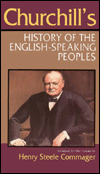
| A History of the English-Speaking Peoples
Winston ChurchillChurchill is of course best known as a statesman, but he was also a historian and master of the English language. This is his history of England and in particular the development of English government and law, his area of special interest. That might sound dull, but it helps to explain
why our world is the way it is today.
| 
| A history of the nutty things people do when they get together in groups. The "tulip-mania" of 1624 makes today's Internet stock frenzy look like grave, considered behavior in comparison. This is a shrewd and satirical look at human folly,
written with a pen dipped in acid. The most useful part of the book to me as a game designer is its account of the Crusades, when hundreds of thousands of peasants, whipped up by religious fervor, abandoned their farms and families and marched off to the Holy Land. What the legends don't tell you is that they were led by frauds and charlatans, and most of the Crusaders starved to death in the forests of Bulgaria. This is history through a jaundiced eye, but it's often wickedly funny. There's
also a useful history of alchemy.
| 
| I picked up a tattered copy of this little masterpiece in my grandmother's basement when I was 18. Reading it in bed that night I was instantly hooked. I took it home with me and never gave it back; through several moves I kept it by me, and only replaced it when it absolutely fell apart twenty years later. The Prince is a classic work on statecraft, the first-ever analysis of what has since come to be called realpolitik.
It is a blunt examination of power: how to get it and how to keep it. Machiavelli studies the actions of famous leaders both of classical antiquity and of his own day, and draws insightful conclusions about why they succeeded -- or failed. There's no hypocrisy here, no cant or sanctimony. He concludes flatly that it is better to be feared than to be loved, and that brutality and bad faith are sometimes required for the good of the state. This book ruined Machiavelli's reputation for all time;
it's the reason his name is synonymous with deviousness and cunning. Required reading for any game designer who wants to create a political backstory for his game.
|
| Myths and Legends |
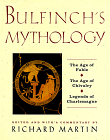
| An excellent quick-reference source for the myths and legends of Europe. If you need to know who Hercules' parents were, this is the place to look: it's neatly organized and clearly written. The book actually consists of three separate works: The Age Of Fable covers the gods and goddesses of Greece and Rome, as well as the mythology of the Germanic tribes, England and the Near East. The Legend Of Charlemange are accounts of the reign of the first great French Emperor. The Age Of Chivalry tells the tales of King Arthur and his court, Lancelot and Guenever, and the death of Arthur.
Unfortunately the stories have been "cleaned up" somewhat in order not to offend Victorian sensibilities, so if you want the violence and eroticism of the original material you'll have to look elsewhere.
| 
| This is a classic comparative study of magic and religion across
many times and cultures. It was written in the 1880s and updated considerably over the next several decades – expanded into six volumes, then shrunk down into one again. Regrettably, it reflects the prejudices of the author's era; it assumes that white Victorians represent the peak of human civilization, for example. It's still a valuable resource for all that, one of the first efforts to collect and analyze the nature of mythic material, long predating Joseph Campbell.
| 
| The tales of Greek mythology re-told in an organic, wandering fashion, probably much as they were originally heard, with many wise asides to the modern reader. This book is difficult to use as a reference because of its peripatetic nature, but it's a brilliant evocation-cum-commentary.
| 
| | 
|
One of the greatest of the Norse sagas, this tells the story of the founding of Iceland in direct and personal terms. Egil Skallagrimmson would be a monster by today's standards, a violent and treacherous man, but his tale is no less
fascinating for all that.
| 
| Twelve tales from the golden age of Celtic storytelling. These legends, translated from the Welsh, are the foundation of the Arthur mythology.
|
| Sacred TextsI own a rather odd collection of sacred works. Although I don't use these directly as inspiration for game design, they serve as valuable background material. | 
| The BibleOne of the founding documents of western civilization. The history, philosophy, art and literature of Europe and the Europe-descended cultures are not comprehensible without at least a passing familiarity with Christianity. The King James Version is the best-known and perhaps the most
poetic of the English translations, but it contains a number of translation errors. Later editions like the Revised Standard Version are more technically accurate at some cost in verbal elegance. There's also a huge debate at the moment about "inclusive language," which shows that the politics of our age affect modern translations just as much as the politics of King James' age did his. Be sure to get one with maps and a concordance.
|

| Around 1200 AD Islamic civilization reached heights of literature, architecture, science, medicine and mathematics that left Christian Europe in the dust. The recent tensions among Christians, Muslims and Jews have tended to obscure this fact of history, and many Americans are completely ignorant of Islamic achievements. It is now the dominant religion along a swath that runs from Morocco to Indonesia (with gaps). The
Koran is the basis of Muslim spirituality, and its teachings underlie much of the culture of the Near East. The Koran is not supposed to be translated from Arabic, so Pickthall gets around this by calling it "The Meaning of..." rather than the Koran itself. I have no idea whether Muslim scholars would regard this as a faithful version, but it happens to be the one I own.
| 
| One of the central
books of Chinese literature and Chinese thought, memorized and studied for many centuries. Confucius (Kung-fu-tze) was not a holy man or prophet in the western sense; rather, he was a government official and a teacher, which tells you a lot about the differences between Chinese and western spirituality. Confucius emphasized the moral life, public service, respect for one's parents and ancestors, and above all adherence to tradition. The book consists of a series of sayings or short parables
illustrating these points, and it explains much about Chinese culture, even today.
| 
| Taoism is not a religion but an approach to life. This short book of poetry describes, in lyrical but paradoxical terms, the tao (which means "way" or "path"). One either follows the tao or does not. Among the keys to the tao is surrender, acquiescence, and seeking not to resist. Following the tao leads to an inner peace and strength which is denied to those who
struggle to achieve. This is another classic of Chinese philosophy, quite different from the Analects.
|
| TechnologyI'm interested in
technology both ancient and modern. That's technology as distinguished from technofetishism, which bores me. I don't keep a lot of books about technology around, but these are a few that I think are helpful references. | 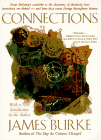
| Ever wonder why your negatives say "safety film" along the top edge? It's because they're not made from celluloid, the substance that
replaced glass plates in photography, but one which burns like crazy. Celluloid itself was an outgrowth of the search for better billiard balls, which were derived from gun cotton, which... Based on a sparkling series of hourlong TV documentaries, this book illustrates just how strangely tangled the course of technological history is. Inventions in one area go on to spark inventions in completely different areas, in ways that no one could ever predict. I
learned a great deal of technological history from this imaginative work. Unfortunately, it's out of print, but used editions are not hard to find.
| 
| A scholarly but very readable book about the great engineering projects of the ancient world. No garbage about "ancient astronauts" here; this shows how these magnificent projects could have been done with nothing
more than intelligence, hard work, and perseverance. The great works of the past were triumphs of human ingenuity. To suggest that their builders must have had "alien" assistance is an insult to their achievements.
| 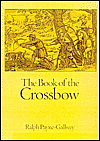
| Originally just called The Cross-Bow, this is a Dover Publications reprint of a 1903 book about the construction of medieval crossbows, and more importantly to me, medieval siege weapons. Balistas, catapults, and trebuchets are all discussed in detail, and the book is plentifully illustrated. This is the best reference I've found on the subject, and it includes enough plans and descriptions to enable any game developer to model these weapons accurately. Unfortunately the author did not know much about ballistics, and so although he documents the draw-force of the weapons, he doesn't discuss such details as exit velocity or air resistance. However, it's still unmatched for period detail.
|
| Graphic DesignI'm not an artist by any stretch of the imagination, but as a game designer I do have to think about the way information is
presented. My library includes only three works on graphic design and they're all by the same person. The books themselves are beautifully-made large format hardbacks printed on 100% rag paper. They are expensive, but worth it -- considered classics in the field.
| 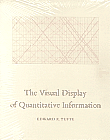
| The Visual Display of Quantitative Information
Edward TufteDon't be put off by the title -- this is the reference work on accurately displaying numerical information. Even the most frenetic shooter still frequently needs to display numbers from time to time: hit points, armor strength,
ammunition remaining, and so on. This book will show you how to do it clearly and cleanly. Tufte places a strong emphasis on integrity, too: how to show numbers so that they tell the truth. You'll never look at a statistical graphic in the newspaper in the same way again.
| 
| Envisioning Information
Edward TufteEnvisioning Information picks up where The Visual Display of Quantitative Information left off. It discusses such things as color, using small multiples to demonstrate patterns of change, showing multidimensionality in two dimensions, and on and on. One of the most poignant passages demonstrates how poorly-designed graphics obscured vital information about the performance characteristics of the space shuttle's O-rings during the debates that preceded the launch of Challenger. A well-designed graph would have clearly illustrated the problem and might have saved seven lives.
| 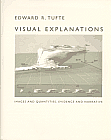
| Visual Explanations: Images and Quantities, Evidence and Narrative
Edward TufteThis book is about verbs, and how to describe and demonstrate processes: things that change. Since computers can show animations, Tufte's emphasis on the printed page is less relevant to the game designer, but it still contains a valuable discussion of the issues involved.
|
| FictionMuch of interactive entertainment obtains its plots, characters, themes, and settings by borrowing them from books. These are some of the best ones to borrow from. | 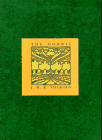


| The Hobbit, The Lord of the Rings, The Silmarillion
J.R.R. TolkienI put these first because they are the simply most important books to influence computer game design in entire history of the medium. Towering works of imagination, far surpassing anything else of their kind. I used to think these were just long, entertaining fantasy books. The more I learn about North European
myth and legend, and about the Anglo-Saxon language, the more I realize how incredibly deeply-rooted these stories are. Tolkien's scholarship is breathtaking. Yet for all that it's completely accessible; you don't have to know anything about anything to read and enjoy these books. They're are also the prototype for 90% of the fantasy written in the 20th century, and 99% of the fantasy computer games. In spite of my deep love for these works, I believe they (or their mythic matter) have
been over-expoited by the game industry, and it's time that we started to draw our inspiration from a different well. Europe is not the only continent with great legends. Some people own heirloom family Bibles. I own beautiful boxed hardcover editions of Tolkien.
|   
| The Earthsea Trilogy
Ursula K. LeGuin
The trilogy consists of A Wizard of Earthsea, The Tombs of Atuan, and The Farthest Shore. These books are proof that you can write sword-and-sorcery fantasy that isn't a ripoff of Tolkien. Although they were written for children, they're richly imagined and have deep, three-dimensional characterizations of their heroes. The plots are gripping too. Unlike many novels that explore character, you don't have to give up excitement for depth. Unlike Tokien, they're written in neat, modern English, although occasionally they're (intentionally) ambiguous. Highly recommended.
Controversy surrounds the "fourth" book in the series, Tehanu: The Last Book of Earthsea. If you loved the first three, I'd skip it. Written many years later, it seems to be more of an experiment in feminist fantasy fiction than a continuation of the series. While it is true that maintaining hearth and home -- traditional female roles -- is both hard and virtuous work, deserving of support and admiration, nevertheless it
isn't very interesting to read about unless it differs substantially from what we're already familiar with. In her desire to tell the story of a non-magical woman in Earthsea, LeGuin seems to have forgotten that people read fantasy in order to experience a magical world vicariously through the book's heroes. Tehanu's life is simply too dull to belong in the series.
|
|
Book cover images courtesy of Amazon.com and Barnesandnoble.com. |